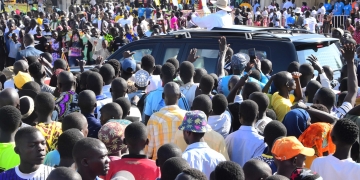
ENTEBBE, Uganda — President Yoweri Museveni met with World Food Programme (WFP) officials at State House in Entebbe to discuss shifting from traditional humanitarian aid to sustainable, agriculture-based solutions for refugees in Uganda.
Museveni advocated for reorganizing refugee settlements into more compact, planned communities to free up land for collective farming, aiming to promote self-reliance. He argued that current settlements, often spread out with makeshift shelters, hinder large-scale agriculture and economic activity.
“Uganda has always welcomed our displaced brothers and sisters, but we must now move beyond emergency response,” Museveni said. “The challenge is that most refugee settlements are spread out inefficiently, with vast land occupied by scattered makeshift shelters. This hinders large-scale farming and economic activity.”
Uganda hosts over 1.8 million refugees and asylum seekers, primarily from South Sudan, the Democratic Republic of Congo, and Burundi. Museveni cited the 71-square-mile Nakivale Refugee Settlement as an example of land that could be transformed into productive farmland with proper planning and investment.
“If we adopted a more structured approach similar to building small campuses or villages, we could maximize land use, promote food production and even generate surplus for sale,” Museveni said.
He emphasized that Uganda’s refugee policy is rooted in a Pan-African philosophy, viewing displaced persons as part of the broader regional community. “These people are not foreigners in the real sense. Many of them share ethnic and cultural ties with Ugandans. Our borders are artificial drawn by colonialists. So, when they come here, we treat them as our own,” he said.
WFP officials, including Executive Director Cindy McCain, welcomed Museveni’s proposals. McCain praised Uganda’s “bold and compassionate” refugee policies and its untapped agricultural potential.
“The land here is very large and fertile. As WFP, we are confident in your proposal to create agricultural opportunities in these areas,” McCain said. “The message we are taking back to both large and small donors is that Uganda is working to make these communities more self-reliant and self-sustaining.”
McCain also reaffirmed WFP’s commitment to continued partnership and support for Uganda’s efforts in food security and refugee integration.
“We truly value our partnership and friendship with Uganda. We must support efforts that empower people rather than just pulling back aid,” she said.
WFP Country Director Marcus Prior commended his team’s efficiency and the strong collaboration with the Ugandan government, particularly the Office of the Prime Minister.
“We have an excellent working relationship with the Ministry under Hon. Eng. Hilary Onek, and that collaboration is key to our progress,” Prior said.
Prior reiterated WFP’s commitment to ensuring refugees thrive in Uganda. “We commend you for giving the refugees a chance to rebuild their lives. WFP will continue to explore every sustainable angle to ensure they survive with dignity and our support,” he said.
The meeting was also attended by WFP officials Rukia Yacoub, Meghan Latcovich, Alessandro Ceretti, and Julian Civiero.










Discussion about this post